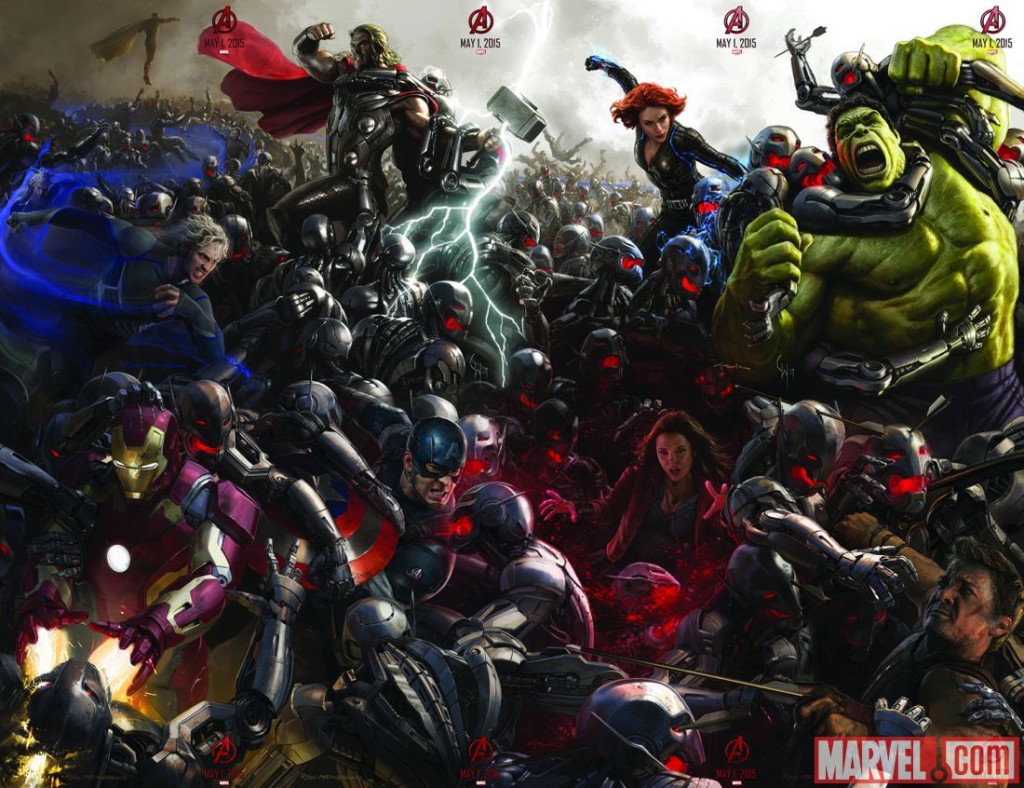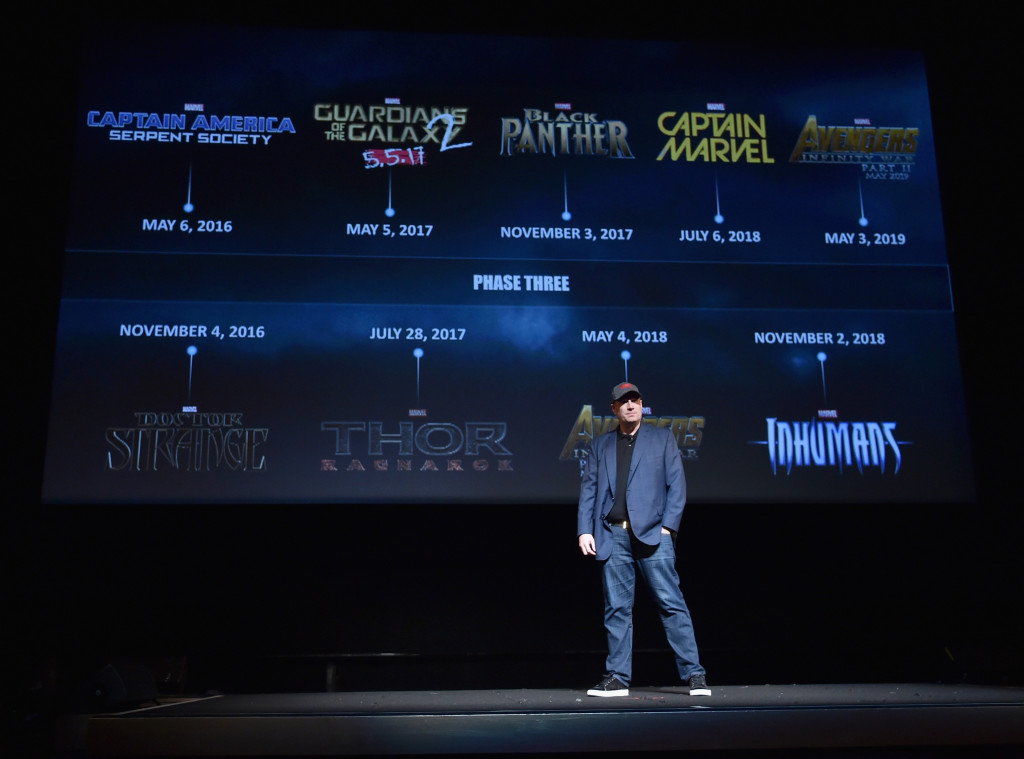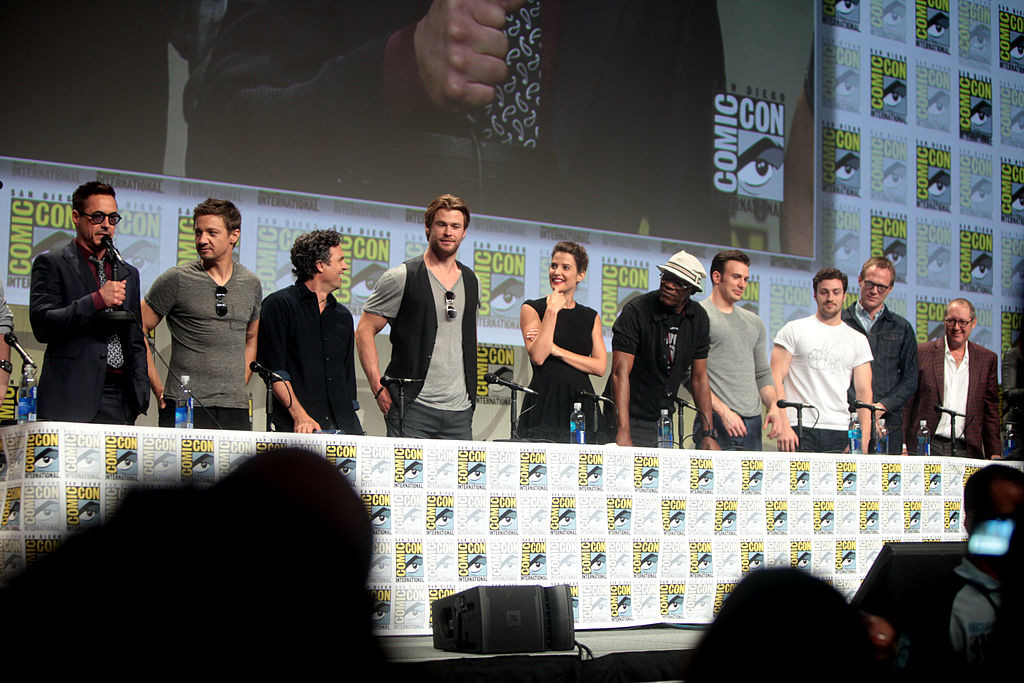
It’s hard to watch a movie–let alone write a review of said movie–as a self-contained entity when the movie doesn’t even think of itself as such. To comment on Avengers: Age of Ultron is akin to commenting on the efficiency of motor gears rather than “writing about art,” because this cinematic machine is going to keep chugging away regardless of what anyone thinks about it, as long as audiences continue to pack the theaters with clockwork-like reliability.
As a brand, Marvel has both hit the jackpot and set itself up to keep winning. It has successfully transcended its own niche audience, overriding pop culture so completely that to opt out of the Marvel Universe is akin to making a political statement: you’d better have a damned good reason, or be the kind of person who revels in any opportunity to seem pretentious. As someone who likes pop culture and thinks of myself as generally conversant therein, I felt the intense pressure to keep up with the Avengers, even though I don’t particularly like superhero movies. The pressure comes from all over–friends, entertainment writers, commercials–but these are all just different facets of the same force: the relentless, million-dollar public relations campaign and entertainment machine that is Marvel.
To the wizened and cynical, this doesn’t seem new at all, or unique to the Marvel brand. This is true–Hollywood and our mass-produced pop culture have turned the public’s tastes into commodities to be bought and sold for nearly a century. However, what is different about the Marvel model–and what makes this model’s replication across Hollywood indicative of a new age in the industry–is its patented concept of a “Cinematic Universe,” where the external world precedes the world within each of the individual films. That global PR campaign of Marvel’s entertainment domination, predicated on connected storylines and TV spinoffs, is the real “story” that Marvel is selling, rather than any particular film. The plot and storyline of each movie could hardly be more beside the point; they are just formalities, boxes to be checked off, rather than the focus of anything important.
Before this new age of the “Cinematic Universe” (even during the golden age of the universe’s predecessor, the “franchise”), the industry’s buying and selling of our collective attention was intended to sell us on a specific movie. There was an object to our affection; our manufactured interest was meant to be funneled toward an actual film. And, consequently, that film mattered: there was an arc, there was character development, there was evident care from its studio and producers that what was put in the theatre was a product worthy of such intense hype.
The idea of making a movie after all that buildup that, plainly, was not very good, was horrifying; such an event would be reputation-crushing for all involved. Now, the inverse is true: for a studio to care too much about one single film, when there are vast piles of money to be made by the plurality and longevity of the whole “universal” context of said film, would be naively short-sighted and small-minded. A studio head who doesn’t understand the “big picture” simply doesn’t make it that long as studio head; what matters now is not quality movies but durable brands, and what makes brands durable is their ability to resist change, to remain ably “stampable,” on any product at any time.

This primacy of brand longevity has created an environment in which mediocre films are not only the norm, they are expected. No one in my line at the theatre expected Avengers: Age of Ultron to blow them away with its own cinematic merit. That singular movie-watching experience is not the point of the Marvel movie-watching exercise. The point is to try to fit the movie into the larger schema, to play a game of context clues, looking for Easter eggs, trying to find hints of what will be in the next “phase” of the Marvel blockbuster rollout. Anyone who goes into the theatre wanting a movie that functions on its own and is satisfying unto itself just doesn’t get it. To focus too much on making any of these films genuinely good from a dramatic standpoint–surprising, emotionally engaging, with characters who feel like they’re breathing and alive–would actually push against Marvel’s main interests. Living characters change, and respect for change is not a foolproof foundation for a multimillion dollar company.
Companies want a sure thing. What we are seeing now is the rise of the PR campaign as the story, the brand as the main event. The consequences of Marvel’s successes are echoing across Hollywood, where it now seems that the only weed that can thrive in the Southern California drought is this “Cinematic Universe.” This capitalistic circus wouldn’t bother me so much if this now-controlling idea of brand durability as profit maximization didn’t come directly at the expense of the thing these brands are supposed to be producing: quality films. Instead of being innovative and taking creative risks, studios wrestle over rights to the slam dunks, the stories that are literally timeless–fairy tales, superheroes, spinoffs of Harry Potter. We get the same, static cartoons, stamped into the latest blockbuster, as studios run in lucrative, cowardly circles.
What is worse than this blatant prioritization of business and marketing at the expense of quality storytelling is the effect it is having on audiences. People are effectively being conditioned to not expect a fully immersive story, or surprise, or any feeling of emotional investment in the characters on screen. As viewers file into theatres showing Avengers: Age of Ultron, they are fully aware of Marvel’s real-world star signings and action hero lines; the aggressive publicizing of contract negotiations and business moves builds the perceived sturdiness of the Marvel Universe brand, but it also denies each story within that universe the ability to actually be surprising. The kids next to me in line were guessing which heroes would be included in which of the upcoming movies, as though the Avengers were all players on a sports team and we were about to see just one game in a long season.

In some ways this realignment of filmmaking’s core priorities feels like a disrespect to the whole idea of a blockbuster or a “tentpole”–nominally something that can stand alone. These films are supposed to be something you wait for, an event that only happens once (or at least feels that way as you’re watching it). You watch with the feeling that this is it, this is that singular thing that has been built up and marketed and greedily anticipated for months, if not years; you are finally here and ready to give yourself completely over to this cinematic experience for a couple hours and then live residually within it for a day or so after, in a popcorn and sour straws hangover, along with everyone else who had had this weekend circled on their calendars.
For Marvel, and indeed for the new era which Marvel’s ongoing profitability no doubt ushers in, such “event” movies are actually deincentivized. The whole point is to constantly allude outward, to make encouraging references to the brand’s other properties and future projects while altering as little of the original formula in each film as possible. Surprising changes are risks to the timelessness of the brand, and why even take the risk when people are going to pack the theatres regardless? We all know that Robert Downey Jr. is going to be in Captain America: Civil War, so we have no real reason to fear for his life in Ultron; we all still go to both anyway.
In many ways these films feel like episodes of a sitcom–a more morally aspirational, superhero edition of Seinfeld, where no one ever learns and nothing ever changes. Character development can only occur over the course of the film in the interest of making this particular movie bearable; it can’t change anything truly essential about any given superhero, because that superhero needs to be back to his or her timeless comic book self for the next go-round, as though plucked from the dusty back shelf of a used bookstore without the previous movie even happening.
As the Marvel model takes over Hollywood, I wonder if kids raised on the Avengers will ever walk into a theatre with that giddy readiness to be totally shocked, to be taken for a narrative ride they never expected. We’re creating a generation of movie-watchers that resists the essential magic of movies, that instead will come to expect and desire the level of comfortable familiarity from the theatre that I desire when I tune into a Friends rerun. I don’t even know where I’ll be living or whether I’ll be married in the year 2019, but I do know a Marvel superhero movie, with the same stock characters and plotlines, will be coming to a theatre near me.
There’s a place for that sort of permanency in entertainment. The cineplex shouldn’t be it.
